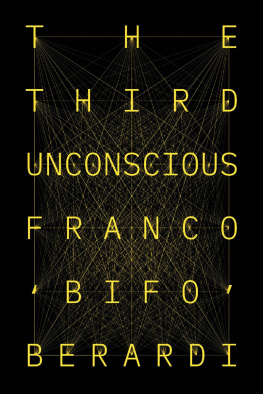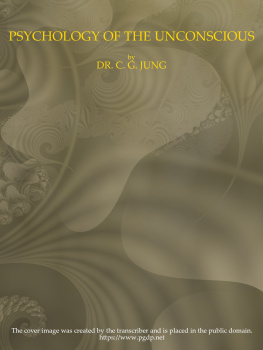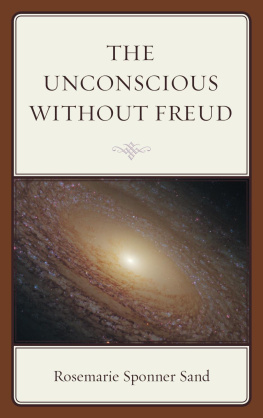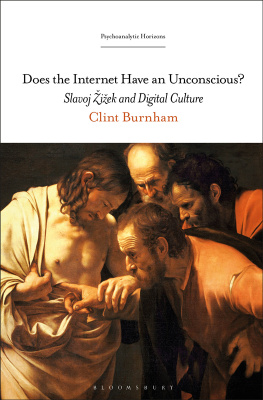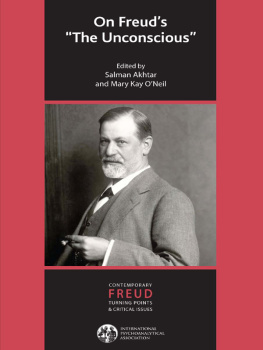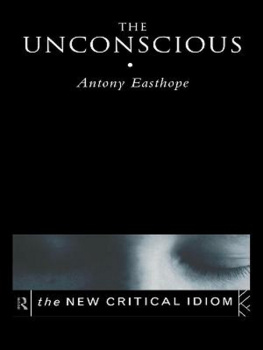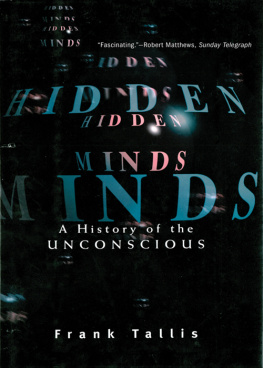Contents

The Third Unconscious
The Third Unconscious
The Psycho-sphere in the Viral Age
Franco Bifo Berardi

To Federico Campagna,
the hidden instigator of this book
First published by Verso 2021
Franco Berardi 2021
All rights reserved
The moral rights of the author have been asserted
1 3 5 7 9 10 8 6 4 2
Verso
UK: 6 Meard Street, London W1F 0EG
US: 20 Jay Street, Suite 1010, Brooklyn, NY 11201
versobooks.com
Verso is the imprint of New Left Books
ISBN-13: 978-1-83976-253-6
ISBN-13: 978-1-83976-254-3 (UK EBK)
ISBN-13: 978-1-83976-255-0 (US EBK)
British Library Cataloguing in Publication Data
A catalogue record for this book is available from the British Library
Library of Congress Cataloging-in-Publication Data
A catalog record for this book is available from the Library of Congress
Typeset in Sabon by MJ & N Gavan, Truro, Cornwall
Printed and bound by CPI Group (UK) Ltd, Croydon CR0 4YY
Contents
This book explores the ongoing mutation of the social Unconscious. My point of observation is that which we inhabit at present: the historical threshold marked by the viral pandemic and by the catastrophic collapse of capitalism. From this threshold, we can see ahead of us a horizon of chaos, exhaustion and tendential extinction.
This mutation is perfectly summarised by the Japanese philosopher Sabu Kosho. In his book Radiation and Revolution (2020), Kosho writes with hopeless clarity: Philosophically, this is an ontological shift from dialectics to immanence from totalization by capitalism and by the state to the omnipresence of singular events. In this shift lies the prospect of planetary revolution to be grasped in the decomposition of the World and the rediscovery of the Earth.
The concepts that emerge in Sabu Koshos understanding of the Fukushima 2011 apocalypses are key for interpreting the global apocalypses of 2020: the ubiquitous, unstoppable proliferation of the principle of dissolution (radiation, viruses), the erosion of all symbolic and political orders, and the comeback of the long-denied Earth. Terra, defined by Deleuze and Guattari as the great deterritorialised, is reasserting itself and sweeping away the pathetic power of politics with the force of tsunamis, wildfires, viral epidemics.
I think that philosophy and psychoanalysis, far from panicking, far from railing against chaos, should assume the horizon of chaos and of exhaustion as a starting point for their reflection. Everything needs to be redefined, particularly what takes place in the intimate space of desire, emotion, fear.
The Unconscious is a realm without history, with no sequentiality, no before and after: it would be impossible to write a History of the Unconscious. But it is possible to describe a history of the psycho-sphere of a society, and, in this sense, it is possible to speak of a third Unconscious: the third form taken by the Unconscious within the late modern mental environment.
The first phase was explored by Freud, who conceived the Unconscious as the dark side of the well-ordered framework of Rational Progress.
Science, education, industriousness were the pillars of modern public life. Marriage, monogamy and nuclear family were the pillars of modern private life.
In Civilization and Its Discontents (1930), Freud asserted that social normality demands a high degree of denial of desire or repression of Trieb (sexual drive and instinctuality). The bourgeois form of normality dominant in the early twentieth century produced a particular form of suffering that Freud called neurosis. To run the daily business of life, the modern individual was obliged to renounce, to repress, and possibly to forget their own sexual drives and this removal was pathogenic. Neurosis was the general form of this pathology.
The framework changed in the last decades of the twentieth century, when the acceleration of the info-sphere and the intensification of the nervous stimulation (internet communication and cultural globalisation) jeopardised the systemic repression of desire and the psychopathological regime of neurosis.
The first intuition of this transformation of the psycho-cultural landscape can be found in Deleuze and Guattaris Anti-Oedipus, the book that marked the shift from structuralism to creative-rhizomatic thought but also the book that conceptually opened a Pandoras box of desire, thus anticipating the neoliberal hypermobilisation of desires energy as disjoined from pleasure.
In Anti-Oedipus, Deleuze and Guattari reject the idea that the Unconscious is a sort of depository of the experiences that we dont want to see, or to remember, or to bring into our conscious life. The Unconscious is not a theatre, but it is a laboratory: the unconscious is the magmatic force that ceaselessly brings about new possibilities of imagination and experience.
Today, fifty years after the publication of Anti-Oedipus, we can read the creative thought of Deleuze and Guattari as the ambiguous (extremely ambiguous, and extremely rich) cast for a double-edged future: the utopian future of the liberation of desire and the dystopian future of neoliberal capitalism, where desire is celebrated as the impulse of consumption, competition and economic growth, while pleasure is constantly postponed.
The entire media system has been mobilised to expand on the promises of enjoyment, but this acceleration of the information-flow has overloaded the capacity of human attention, thus ever postponing the possibility of pleasure, which has ultimately become unattainable. This social regime has led to the configuration of a new psychopathological regime, which has characterised the past few decades: the age of panic, depression and, ultimately, psychosis.
Panic means perception of the excess of possibility, intuition of an inaccessible amount of pleasure. A person panics because they are in view of an excess of pleasure that they cannot actually experience. Panic is a line of escape from depression, and depression is the reassuring comeback from a panicking trip. This is the inner oscillation of the postneurotic psycho-sphere.
In the age of the Second Unconscious, neurosis is no longer the general mode of psychic suffering. As the explosion of the unconscious leads to a condition of nervous hyperstimulation and psychological frustration, psychosis takes the place of neurosis.
The rhizomatic whirlwind of the networked experience drags the unconscious, which Freud defines as Innere Ausland (the intimate foreign land), out of itself, externalising it to the point of a psychotic explosion.
I call semiocapitalism this linkage of accumulation, semiotic production and nervous stimulation.
Guattari suggests that schizophrenia has to be considered as a condition of the free production of meaning. In his thought, the schizoid becomes the crucial figure of an adventure of liberation, creativity and knowledge. But this is only the liberating side of the acceleration. There is another side to it, which was denounced by Jean Baudrillard in Symbolic Exchange and Death (1976): the breathtaking acceleration of nervous stimulation (seduction, simulation, hyperreality) goes hand in hand with neoliberal globalisation, provoking a disturbance in the sphere of experience.

